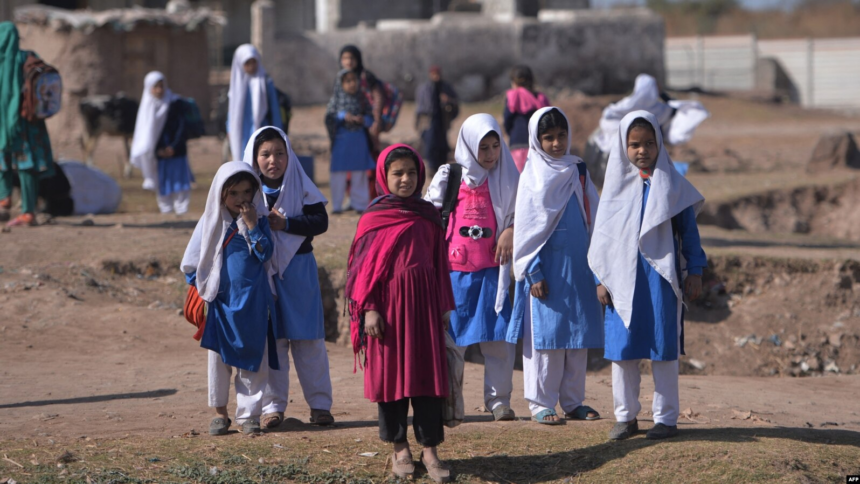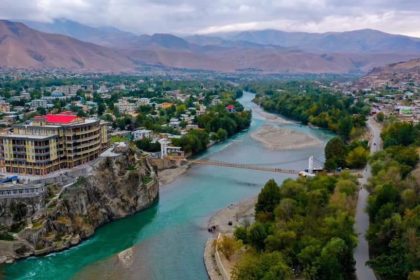RASC News Agency: As the Taliban’s ban on girls’ education beyond the sixth grade remains firmly enforced inside Afghanistan, a new report by the United Nations Regional Refugee Response Plan (RRP) reveals a deepening educational crisis for Afghanistani refugee children in Pakistan. Over 194,000 school-age children and adolescents, the majority of them girls, have been denied access to education trapped in a web of displacement, legal barriers, and international neglect. The ten-page report, released on Friday, June 13 via the humanitarian platform ReliefWeb, highlights the devastating impact of statelessness and bureaucratic exclusion. Thousands of Afghanistani children are unable to attend school simply because they lack official documents required for registration. The report further warns that chronic underfunding of refugee education programs is pushing the crisis toward an irreversible breaking point.
“Without urgent, long-term investment in refugee education,” the report cautions, “an entire generation of Afghanistani children will be left behind robbed of their right to learn, to grow, and to build futures beyond war and repression.” The situation is further compounded by Pakistan’s tightening immigration policies. Afghanistani families living in legal limbo are subjected to repeated harassment by police, arrest without due process, and rising hostility from local authorities. Parents are unable to register their children in either public or private schools due to visa restrictions, lack of identification, or fear of deportation. Maiwand Elmi, the head of the Afghanistani Refugee Council in Islamabad, estimates that only 20% of Afghanistani children in Pakistan are currently enrolled in school mostly boys in private institutions. The remaining 80%, he says, are completely deprived of formal education. “Public schools refuse to accept them,” Elmi said. “And among those excluded, the vast majority are girls.”
While some children have gained access to informal learning centers supported by UN agencies, these makeshift classrooms are few and under-resourced. According to the RRP, just 112,000 Afghanistani children were reached in 2024, despite the growing scale of displacement. Over half of them are girls but with funding gaps, even these fragile gains are at risk. At the heart of this humanitarian catastrophe lies the Taliban’s systematic assault on education particularly girls’ and women’s access to learning. Since the group’s return to power in August 2021, it has banned girls from secondary schools and universities, dismantled decades of educational progress, and turned classrooms into ideological battlegrounds.
The result: tens of thousands of Afghanistani families have fled to Pakistan and Iran, desperately seeking an education for their daughters. But Taliban repression, far from being confined within Afghanistan’s borders, has created a transnational crisis forcing displaced children into poverty, statelessness, and educational limbo. As Taliban leaders continue to speak of “Islamic education,” their policies have instead criminalized intellectual freedom, erased opportunities for women, and actively dismantled institutions that once offered hope to Afghanistan’s youth. Pakistan’s recent mass deportations of Afghanistani refugees have only worsened the crisis. The Ministry of Interior in Islamabad recently announced that over 216,000 Afghanistani nationals have been expelled in the past two months alone. Since 2023, that number has surpassed one million many of them children.
This deportation campaign, which began in October 2023, has disproportionately targeted undocumented refugees, forcing entire families into precarious border zones, refugee camps, or back into Taliban-controlled Afghanistan where education for girls is forbidden, dissent is criminalized, and former state employees are hunted. Observers warn that if urgent international action is not taken, the world may witness the rise of a lost generation of Afghanistani children scattered across borders, stripped of identity, and silenced by both authoritarianism and indifference.
The Taliban’s ideological war on modern education is not only crushing Afghanistan’s domestic institutions it is fueling a ripple effect across the region. And without meaningful intervention, the cost will be borne not just by Afghanistani children, but by the future of an entire nation.






